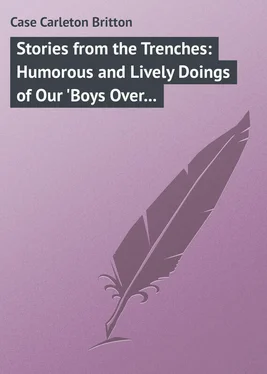Carleton Case - Stories from the Trenches - Humorous and Lively Doings of Our 'Boys Over There'
Здесь есть возможность читать онлайн «Carleton Case - Stories from the Trenches - Humorous and Lively Doings of Our 'Boys Over There'» — ознакомительный отрывок электронной книги совершенно бесплатно, а после прочтения отрывка купить полную версию. В некоторых случаях можно слушать аудио, скачать через торрент в формате fb2 и присутствует краткое содержание. ISBN: , Издательство: Иностранный паблик, Жанр: foreign_prose, foreign_humor, Анекдоты, на английском языке. Описание произведения, (предисловие) а так же отзывы посетителей доступны на портале библиотеки ЛибКат.
- Название:Stories from the Trenches: Humorous and Lively Doings of Our 'Boys Over There'
- Автор:
- Издательство:Иностранный паблик
- Жанр:
- Год:неизвестен
- ISBN:http://www.gutenberg.org/ebooks/49653
- Рейтинг книги:3 / 5. Голосов: 1
-
Избранное:Добавить в избранное
- Отзывы:
-
Ваша оценка:
- 60
- 1
- 2
- 3
- 4
- 5
Stories from the Trenches: Humorous and Lively Doings of Our 'Boys Over There': краткое содержание, описание и аннотация
Предлагаем к чтению аннотацию, описание, краткое содержание или предисловие (зависит от того, что написал сам автор книги «Stories from the Trenches: Humorous and Lively Doings of Our 'Boys Over There'»). Если вы не нашли необходимую информацию о книге — напишите в комментариях, мы постараемся отыскать её.
Stories from the Trenches: Humorous and Lively Doings of Our 'Boys Over There' — читать онлайн ознакомительный отрывок
Ниже представлен текст книги, разбитый по страницам. Система сохранения места последней прочитанной страницы, позволяет с удобством читать онлайн бесплатно книгу «Stories from the Trenches: Humorous and Lively Doings of Our 'Boys Over There'», без необходимости каждый раз заново искать на чём Вы остановились. Поставьте закладку, и сможете в любой момент перейти на страницу, на которой закончили чтение.
Интервал:
Закладка:
The war under the earth is a most extraordinary thing. In the main, the army you see in the war zone is not a combatant army. It is the army of supply. The real fighters you seldom set eyes on unless you go and look for them. And, generally speaking, the ghastliness of war is carried on beneath the earth’s level.
Given time, the Boche will take a lot of beating as an earth delver. At one spot on the Somme I went into a veritable underground town, where, till the British deluge overtook them, three thousand of the toughest Huns the Kaiser had put into his line lived and thrived. They had sets of compartments there, these men, with drawing-rooms complete, even to the piano, kitchen, bathroom, and electric light, and I was told that there was one place where you could have your photograph taken, or buy a pair of socks! Every visitor down the steps – except the British – was required to turn a handle three times, which pumped air into the lower regions. If you descended without pumping down your portion of fresh air you were guilty of bad manners.
Anything more secure has not been invented since Adam. But this impregnable city fell last year, as all things must fall before the steady pressing back of British infantry.
The writer tells of discovering in an old French town that was then under fire a shell-torn building on which were displayed two signs reading “First Aid Post” and “Barber Shop.” He says:
When I dived inside I saw one man having his arm dressed, for he had been hit by a piece of shell in the square, and in a chair a few yards away a Tommy having a shave. Coming in as a stranger, I was informed that if I didn’t want a haircut or a shave, or hadn’t a healthy wound to dress, this was not the Empire music hall, so I had better “hop it.”
It was in “hopping it” that I got astride an unseen fiber of British communication. I went into the adjoining ruins of a big building. A single solitary statue stood aloof in a devastation of tumbled brick and stone. Then, as I was stepping from one mound of rubble to another, as one steps from rock to rock on the seashore, I heard voices beneath me. The wreckage was so complete, so unspeakably complete, that human voices directly under my feet seemed at first startling and indefinite. Moreover, to add to my confusion, I heard the baa-ing of sheep, likewise under the earth. But I could see no hole, no outlet.
With the average curiosity of the Britisher I searched around till I discovered a small hole, a foot in diameter, maybe, and a Tommy’s face framed in it laughing up at me.
“Hello!” he said.
I pulled up, bewildered, and looked at him.
“What in Heaven’s name are you doing in there?” I asked.
“We’re telephones… Got any matches?”
“I heard sheep,” I informed him.
“And what if you did? Got them matches?”
I tossed him a box. He dived into darkness, and I heard him rejoicing with his pals because he’d found some one who’d got a light. It meant almost as much to them as being relieved.
So here was a British unit hidden where the worst Hun shell could never find it, and, what was more, here was the food ready to kill when, during some awkward days, the Boche shells cut off supplies.
Then look on this picture of a war-desolated country where nature has been stupidly scarred by Teuton ruthlessness, and rubble-heaps are marked by boards bearing the name of the village that had stood there:
The desert was never more lonely than those vast tracts of land the armies have surged over, and this loneliness and silence are more acute because of the suggestions of life that have once been there. It is impressive, awe-inspiring, this silence, like that which follows storm.
Clear away to the horizon no hedge or tree appears, all landmarks have gone, hills have been planed level by the sheer blast of shells. Here is a rubble-heap no higher than one’s shoulders where a church has stood, and the graves have opened beneath pits of fire to make new graves for the living. Patches of red powder, washed by many rains, with a few broken bricks among them, mark the places where houses, big and small, once rested. To these rubble-heaps, which were once villages, the inhabitants will come back one day, and they will scarcely know the north from the south. Indeed, if it were not for the fact that each rubble-heap bears a board whereon the name of the village is written, in order to preserve the site, they would never find their way there at all, for the earth they knew has become a strange country. Woods are mere patches of brown stumps knee-high – stumps which, with nature’s life restricted, are trying to break into leaf again at odd spots on the trunks where leaves never grew before. Mametz Wood and Trone Wood appear from a short distance as mere scrabblings in the earth.
The ground which but a few months ago was blasted paste and pulverization has now under the suns of summer thrown up weed growth that is creeping over the earth as if to hide its hurt. Wild convolvulus trails cautiously across the remnants of riven trenches, and levers itself up the corners of sand bags. In this tangle the shell holes are so close that they merge into each other.
The loneliness of those Somme fields! No deserts of the world can show such unspeakable solitude.
One comes from the Somme to the freed villages as one might emerge from the desert to the first outposts of human life at a township on the desert’s rim. Still there are no trees on the sky-line; they have all been cut down carefully and laid at a certain angle beside the stumps just as a platoon of soldiers might ground their arms. For the German frightfulness is a methodical affair, not aroused by the heat of battle, but coolly calculated and senseless. Of military importance it has none.
In these towns evacuated by the Germans life is slowly beginning to stir again and to pick up the threads of 1914. People who have lived there all through the deluge seem but partially aware as yet that they are free. And some others are returning hesitatingly.
Mr. Flower notes with interest the temperamental change that has been wrought by the war in the man from twenty to thirty-five years old. To the older ones it all is only a “beastly uncomfortable nuisance,” and when it is over they will go back to their usual avocations. Here is the general view of the middle-aged men in the battle line:
“What are you going to do after the war?” I asked one.
I believe he thought I was joking, for he looked at me very curiously.
“Do?” he echoed. “I’m going to do what any sane man of my age would do. I’m going straight back to it – back to work. This is just marking time in one’s life, like having to go to a wedding on one’s busiest mail day. I’m not going to exploit the war as a means of getting a living, or emigrate, or do any fool thing like that. I’m going straight back to my office, I am. I know exactly where I turned down the page of my sales book when I came out – it was page seventy-nine – and I’m going to start again on page eighty.”
With the younger men it is different. It has struck a new spark in them and fired a spirit of adventure. There are those who even enjoy the war, and to whom one day, when peace comes, life will seem very tame. The writer cites this case:
He is quite a young man, and what this adventurous fellow was before he took his commission and went to the war I do not pretend to know. But he displayed most conspicuous bravery and usefulness from the hour he fetched up at the British front.
One day he was very badly wounded in the back, and as soon as he neared convalescence he became restive and wished to return to his men, and he did return before he should have done. The doctor knew he would finish a deal quicker when he got back to the lines than he would in a hospital.
Читать дальшеИнтервал:
Закладка:
Похожие книги на «Stories from the Trenches: Humorous and Lively Doings of Our 'Boys Over There'»
Представляем Вашему вниманию похожие книги на «Stories from the Trenches: Humorous and Lively Doings of Our 'Boys Over There'» списком для выбора. Мы отобрали схожую по названию и смыслу литературу в надежде предоставить читателям больше вариантов отыскать новые, интересные, ещё непрочитанные произведения.
Обсуждение, отзывы о книге «Stories from the Trenches: Humorous and Lively Doings of Our 'Boys Over There'» и просто собственные мнения читателей. Оставьте ваши комментарии, напишите, что Вы думаете о произведении, его смысле или главных героях. Укажите что конкретно понравилось, а что нет, и почему Вы так считаете.












